|
|
|
Sort Order |
|
|
|
Items / Page
|
|
|
|
|
|
|
| Srl | Item |
| 1 |
ID:
161359
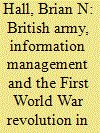

|
|
|
|
|
| Summary/Abstract |
Information Management (IM) – the systematic ordering, processing and channelling of information within organisations – forms a critical component of modern military command and control systems. As a subject of scholarly enquiry, however, the history of military IM has been relatively poorly served. Employing new and under-utilised archival sources, this article takes the British Expeditionary Force (BEF) of the First World War as its case study and assesses the extent to which its IM system contributed to the emergence of the modern battlefield in 1918. It argues that the demands of fighting a modern war resulted in a general, but not universal, improvement in the BEF’s IM techniques, which in turn laid the groundwork, albeit in embryonic form, for the IM systems of modern armies.
|
|
|
|
|
|
|
|
|
|
|
|
|
|
|
|
| 2 |
ID:
106265
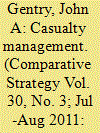

|
|
|
|
|
| Publication |
2011.
|
| Summary/Abstract |
Since World War II, the avoidance, production, and information management of casualties independent of their effects on military forces' combat capabilities have changed political/military operational environments and become major elements of wars' strategies and tactics. Many adversaries of Western states well understand the importance of casualty management. Coherent Western policy and national debates about the strategic consequences of casualties or casualty aversion are lacking, however. This article explores some of the relationships between casualties and military tactics and strategies, domestic and international politics, and operations' outcomes, using the United States as a case study.
|
|
|
|
|
|
|
|
|
|
|
|
|
|
|
|
| 3 |
ID:
128241
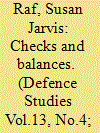

|
|
|
|
|
| Publication |
2013.
|
| Summary/Abstract |
On 30 November 2000 the UK Government enacted legislation leading to the formalisation of freedom of official government information (within specified bounds) for the UK voting public. The Freedom Information Act (FOI Act), although passed into law in 2000, did not come into full effect in the UK until January 2005. In order to 'police' the Act, the Information Commissioner's Organisation (ICO) was set up. The ICO is responsible for monitoring the performance of 43 government bodies1 against performance requirements under the FOI Act 2000. This includes a deadline for responding to initial Requests for Information (RFIs) of 20 working-days. The ICO also handles any unresolved2 complaints or disputes concerning non-disclosure or late release of information requested under an RFI.
To head the ICO, the new post of Information Commissioner was created in January 2001, subsuming the previous role of the Data Protection Registrar.3 The incumbent works within the bureaucracy of the Ministry of Justice (MOJ), reporting directly to Parliament in order to remain politically independent.4 The powers of the Information Commissioner include the use of various levels of sanction. These include formal legal action against government bodies that fail to comply with the provisions of the FOI Act 2000 and other related information legislation.5 Every quarter, and annually, the UK Statistics Authority, on behalf of the ICO and the MOJ, reports on the performance of all 43 monitored government bodies against the requirements of the FOI Act 2000.
|
|
|
|
|
|
|
|
|
|
|
|
|
|
|
|
| 4 |
ID:
100241
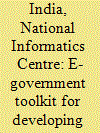

|
|
|
|
|
| Publication |
New Delhi, UNESCO, 2005.
|
| Description |
xi, 209p.
|
| Standard Number |
8189218042
|
|
|
|
|
|
|
|
|
|
|
|
Copies: C:1/I:0,R:0,Q:0
Circulation
| Accession# | Call# | Current Location | Status | Policy | Location |
| 055472 | 352.381724/IND 055472 | Main | On Shelf | General | |
|
|
|
|
| 5 |
ID:
051595
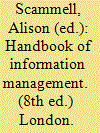

|
|
|
|
|
| Edition |
8th ed.
|
| Publication |
London, Aslib-IMI, 2001.
|
| Description |
xviii, 546p.Pbk
|
| Standard Number |
0851424570
|
|
|
|
|
|
|
|
|
|
|
|
Copies: C:1/I:0,R:0,Q:0
Circulation
| Accession# | Call# | Current Location | Status | Policy | Location |
| 046149 | 658.403803/SCA 046149 | Main | On Shelf | General | |
|
|
|
|
| 6 |
ID:
066400
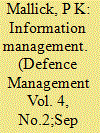

|
|
|
| 7 |
ID:
154823
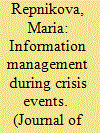

|
|
|
|
|
| Summary/Abstract |
This article examines the evolving process of China’s information management at sub-national level through the prism of a crisis event. Specifically, it investigates the response of officials and the media to Beijing’s fatal floods of 2012—the heaviest and the deadliest floods the Chinese capital has seen in 60 years. The article draws on ethnographic observations, the analysis of interviews with Chinese media professionals, officials and media scholars, as well as the coverage of the storm by two prominent, but distinct Beijing news outlets: an official daily, Beijing Ribao and a commercial daily, Jinghua Shibao. The analysis reveals various strategies deployed by Beijing authorities to positively shape public opinion, and the media’s creative implementation of official directives. Namely, the two newspapers fused regular news coverage with different styles of positive framing. This process of mutual and diverse adaption highlights the increasingly dynamic nature of China’s crisis communication and public opinion management.
|
|
|
|
|
|
|
|
|
|
|
|
|
|
|
|
| 8 |
ID:
049902
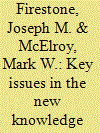

|
|
|
|
|
| Publication |
Amsterdam, Butterworth-Heinemann, 2003.
|
| Description |
xxvii, 350p.Pbk
|
| Standard Number |
0750676558
|
|
|
|
|
|
|
|
|
|
|
|
Copies: C:1/I:0,R:0,Q:0
Circulation
| Accession# | Call# | Current Location | Status | Policy | Location |
| 047358 | 658.4038/FIR 047358 | Main | On Shelf | General | |
|
|
|
|
| 9 |
ID:
075875
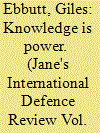

|
|
|
| 10 |
ID:
054703
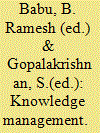

|
|
|
|
|
| Publication |
New Delhi, Ess Ess Publications, 2004.
|
| Description |
412p.Hbk
|
| Contents |
A memorable volume in honour of Dr. Velaga Venkatappaiah on the occasion of his 71st birthday.
|
| Standard Number |
8170003725
|
|
|
|
|
|
|
|
|
|
|
|
Copies: C:1/I:0,R:0,Q:0
Circulation
| Accession# | Call# | Current Location | Status | Policy | Location |
| 048880 | 658.4038/BAB 048880 | Main | On Shelf | General | |
|
|
|
|
| 11 |
ID:
121404
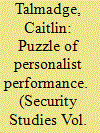

|
|
|
|
|
| Publication |
2013.
|
| Summary/Abstract |
Saddam's Iraq has become a cliché in the study of military effectiveness-the quintessentially coup-proofed, personalist dictatorship, unable to generate fighting power commensurate with its resources. But evidence from the later years of the Iran-Iraq War actually suggests that the Iraqi military could be quite effective on the battlefield. What explains this puzzling instance of effectiveness, which existing theories predict should not have occurred? Recently declassified documents and new histories of the war show that the Iraqi improvements stemmed from changes in Saddam's perceptions of the threat environment, which resulted in significant shifts in his policies with respect to promotions, training, command arrangements, and information management in the military. Threat perceptions and related changes in these practices also help explain Iraq's return to ineffectiveness after the war, as evident in 1991 and 2003. These findings, conceived as a theory development exercise, suggest that arguments linking regime type and coup-ridden civil-military relations to military performance need to take into account the threat perceptions that drive autocratic leaders' policies toward their militaries. After discussing how to define and measure battlefield effectiveness, the article reviews Saddam's changes and their effects; addresses alternative explanations for the improvement in Iraqi effectiveness; and explains how further research based on this initial exercise could generate a better understanding of the observed variation in states' battlefield effectiveness, including variation within and across autocratic regimes.
|
|
|
|
|
|
|
|
|
|
|
|
|
|
|
|
| 12 |
ID:
112225
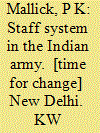

|
|
|
|
|
| Publication |
New Delhi, KW Publishers Pvt Ltd, 2011.
|
| Description |
35p.
|
| Series |
Manekshaw Paper No.31
|
|
|
|
|
|
|
|
|
|
|
|
Copies: C:1/I:0,R:0,Q:0
Circulation
| Accession# | Call# | Current Location | Status | Policy | Location |
| 056416 | 355.330/MAL 056416 | Main | On Shelf | General | |
|
|
|
|
| 13 |
ID:
161273


|
|
|
|
|
| Summary/Abstract |
Our primary aim in this article is to explore vernacular constructions of Europe’s so-called ‘migration crisis’ from the grounded everyday perspectives of EU citizens. We do so as a critical counterpoint to dominant elite scripts of the crisis, which are often reliant upon securitised representations of public opinion as being overwhelmingly hostile to migrants and refugees and straightforwardly in favour of tougher deterrent border security. In addition to broadening the range of issues analysed in vernacular security studies, the article seeks to make three principal contributions. Theoretically, we argue for an approach to the study of citizens’ views and experiences of migration and border security that is sensitive to the performative effects of research methods and the circular logic between securitising modes of knowledge production and policy justification. Methodologically, we outline and apply an alternative approach in response to these dynamics, drawing on the potential of critical focus groups and a desecuritising ethos. Empirically, we identify a vernacular theory of ‘the border’ as information management, and a significant information gap prevalent among participants with otherwise opposing views towards migration. These findings challenge bifurcated understandings of public opinion towards migration into Europe and point to the existence of vernacular border security imaginaries beyond either ‘closed’ or ‘open’ borders.
|
|
|
|
|
|
|
|
|
|
|
|
|
|
|
|
|
|
|
|
|